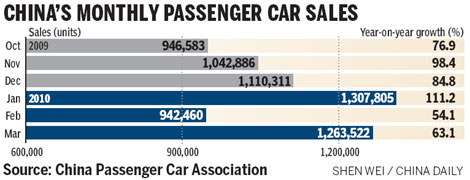BizChina
- Details
- By David Cao
- Hits: 1375

Sales of cellphones using China's own 3G standard (TD-SCDMA) will grow seven-fold this year, boosted by China Mobile's push of new phones and services, research firm Strategy Analytics said on Monday.
The research firm did not unveil total sales estimates, but China Mobile, the world's largest mobile operator by subscribers, has said it had 3.4 million clients using its TD-SCDMA network last year when it opened the service.
The technology's teething problems, along with a lack of product offerings, have been major factors inhibiting the development of a national TD-SCDMA network by China Mobile.
Seven-fold growth from 3.4 million would result in total TD-SCDMA phone sales comparable with sales of Apple iPhones in 2009, and well ahead of Microsoft Windows phones sold by all manufacturers in total last year.
- Details
- By David Cao
- Hits: 1289
Geely Automobile Holdings Ltd, the Chinese automaker whose parent company is buying Volvo Cars from Ford Motor Co, said profit rose on higher car demand and on increased stakes in its operating units.
Net income for the year ended Dec 31 rose to 1.18 billion yuan ($173 million), or 0.17 yuan a share, from 879 million yuan, or 0.14 yuan, a year earlier, Geely said in a Hong Kong Stock Exchange statement on Monday. Revenue more than tripled to 14.1 billion yuan from 4.29 billion yuan.
The carmaker boosted vehicle sales 48 percent last year as China introduced subsidies for small cars, helping the nation's auto demand surpass the United States for the first time.
Cost controls may buffer Geely's earnings against the impact of slower sales growth this year, said Vivien Chan, an analyst at SinoPac Securities Asia Ltd in Hong Kong.
"Automakers need to focus on cost control and introduction of new models to preserve margins this year, with demand growing more slowly," Chan said. "Cost control is Geely's forte."
Geely got government approval to take over five of its operating units in July 2008, and 2009 was the first full earnings year reflecting the expanded business.
Zhejiang Geely Holding Co agreed to pay $1.8 billion for Volvo Cars on March 29, marking the biggest overseas acquisition by a Chinese automaker, after Ford abandoned attempts to make a profit from selling European premium-brand vehicles.
- Details
- By David Cao
- Hits: 1269

Chinese e-commerce giant Alibaba Group said on Monday it will invest 5 billion yuan ($732 million) over the next five years in its online payments subsidiary Alipay.com Co Ltd as part of its effort to maintain its lead over rivals Tencent Holdings and EBay Inc.
The new funds, according to Alibaba, will be used to improve the security of its payment infrastructure, the development of payment products and to attract new customers.
The company said it would also commit additional resources to online safety and security, risk and data management, as well as innovation in new technologies such as mobile payments.
- Details
- By David Cao
- Hits: 1460
China's auto sales are expected to grow by 25 percent this year, as the market continued its robust growth trend in the first quarter, an official from the China Passenger Car Association said on Friday.
March sales of passenger vehicles, including cars, multi-purpose vehicles (MPVs), sports-utility vehicles (SUVs) and minivans, jumped 63 percent from a year ago and 34 percent from February.
First-quarter sales jumped 76 percent to 3.52 million units, as government incentive policies boosted domestic demand, the association said.

"The sales figures last month far surpassed our expectations. We optimistically forecast that total auto sales will grow 25 percent to hit 17 million units this year," said Rao Da, secretary-general of the association.
"As many new models will be launched during the upcoming Beijing auto show which starts on April 23, passenger car sales will continue to grow this month, by at least 26 percent," said Rao.
- Details
- By David Cao
- Hits: 1040
China's trade balance turned red in March, the country's first monthly trade deficit in six years, the General Administration of Customs (GAC) said here Saturday.
China exported $112.11 billion of goods and services in March, up 24.3 percent year on year, while the imports surged 66 percent year on year to $119.35 billion , resulting in a trade deficit of $7.24 billion.
The March deficit was China's first since it posted a 2.26 billion deficit in April 2004, according to a report released by the GAC.
Combining imports and exports, China's foreign trade rose 42.8 percent year on year to $231.46 billion in March, revealed the customs statistics.
Taking the first three months together, China's Jan-March imports and exports rose 44.1 percent to $617.85 billion, still posting a trade surplus of $14.49 billion in the first quarter though it was sharply down 76.7 percent from the same period of last year.
The GAC attributed the March deficit to shrinking exports of labor intensive products, surging imports volumes and rising commodity prices.
Read more: China reports trade deficit in March, 1st time in 6 years
More Articles …
Page 60 of 120